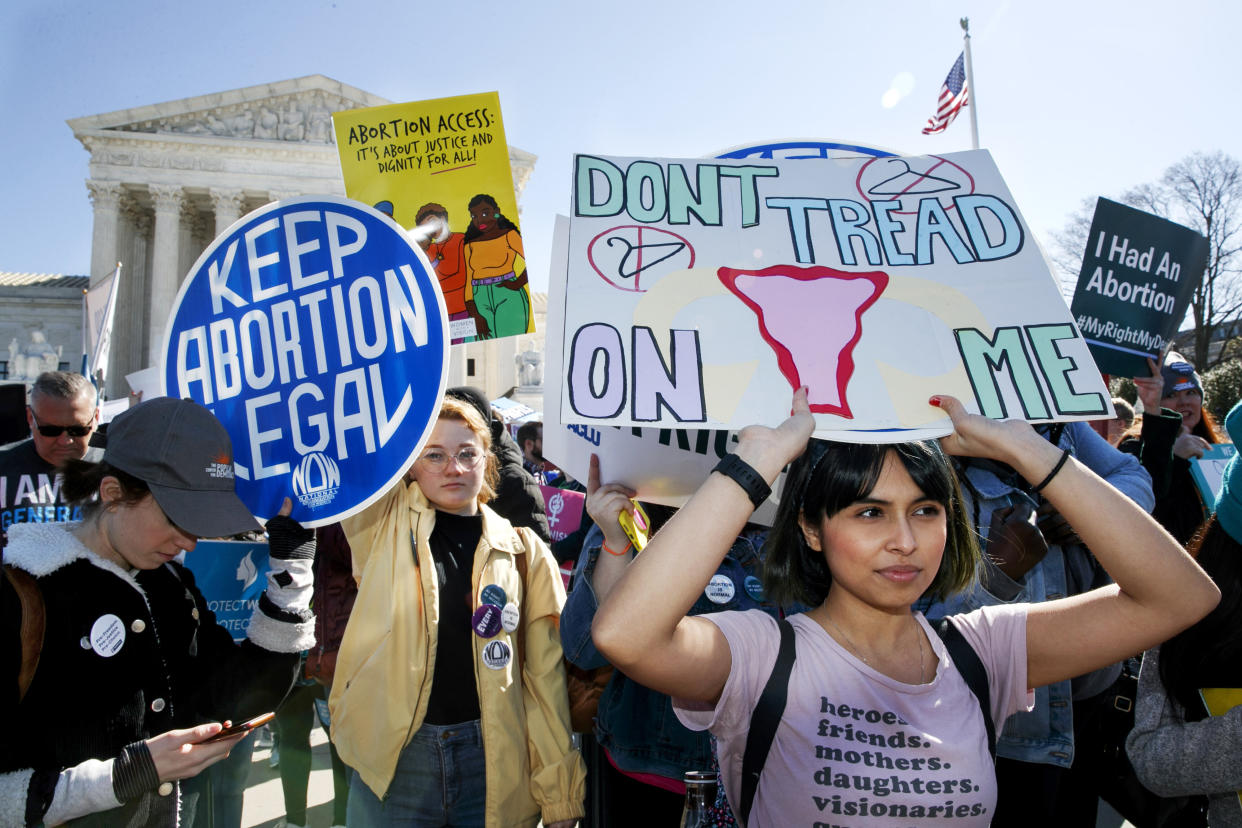Supreme Court Asked To Block Texas’ Abortion Ban Stemming From COVID-19 Crisis

The legal ping-pong match between Texas abortion providers and state leaders seeking to ban the procedure ― ostensibly to conserve medical supplies during the coronavirus outbreak ― arrived at the U.S. Supreme Court on Saturday.
A coalition of Texas abortion clinics asked the high court to take emergency action so that the facilities could resume providing time-sensitive care to patients in the state. For about three weeks, women in Texas have been forced to travel to other states in the middle of the pandemic to exercise their constitutional right to legal abortion.
“This is an extraordinarily difficult time, but this is an easy case,” said Nancy Northup, president and CEO of the Center for Reproductive Rights, which is representing the clinics. “Texas is blatantly abusing its emergency power to obliterate Roe v. Wade. This tactic of using bogus health and safety justifications to close clinics is nothing new.”
Texas Gov. Greg Abbott (R) on March 22 ordered a stop to “all surgeries and procedures that are not immediately medically necessary.” State officials clarified that abortions that were “not medically necessary to preserve the life or health of the mother” qualified for the purposes of the ban.
Texas abortion providers sued Abbott and other state officials, arguing that abortion is an essential, time-sensitive service. On March 30, a federal district judge sided with abortion providers and granted a temporary restraining order, allowing clinics to resume services. Almost immediately, the order was reversed by the U.S. Court of Appeals for the 5th Circuit, reinstating the abortion ban.
On April 9, a federal district court granted a second temporary restraining order, allowing abortion providers to resume some procedures. Once again, the 5th Circuit sided with Texas, reversing part of the order and affirming the ban on most abortions.
Without the Supreme Court’s “urgent intervention, the Fifth Circuit’s stay will continue to deny hundreds of Texas residents their constitutional right to obtain an abortion while exacerbating the current public health crisis, thereby inflicting irreparable harm,” abortion providers wrote in their emergency request to the justices on Saturday. “As a result, they will be forced either to remain pregnant and endure the physical, economic, and emotional consequences of pregnancy or to undertake risky and expensive travel to other states where abortion is still available.”
The request was filed to Justice Samuel Alito. Mary Ziegler, a professor at Florida State University and a historian of abortion law, said he will likely call for a response from the state before referring the matter to the full court.
She noted that half a dozen other Republican-led states have also tried to limit abortions under their emergency response to the pandemic. Similar bans on abortion have been blocked by the courts in Ohio, Oklahoma and Alabama.
“Patients and providers want to know if these bans will hold up outside of Texas,” Ziegler said.
The bigger question at stake, she added, is whether the constitutional right to an abortion, established by 1973′s Roe v. Wade ruling, can be put on hold because of an emergency.
“If the court does create some sort of emergency exception, then what remains to be seen is what constitutes an emergency,” she said. “Everybody agrees that what we’re living through now is an emergency, but what if we flatten the curve but there is no vaccine? Or what if the COVID-19 episode is over but another medical or political issue emerges?”
Alexis McGill Johnson, acting president and CEO of Planned Parenthood Federation of America, said the past few weeks have been untenable for Texas patients seeking abortions.
A recent study found that under Texas’s ban, the average one-way driving distance to an abortion clinic goes from 12 miles to 243 miles.
“Gov. Abbott has blocked abortion access for mothers who have lost their jobs because of COVID-19, people quarantined with abusive partners, and patients with fatal fetal diagnoses,” Johnson said. “Now is the time to be making abortion more accessible, not less.”
A HuffPost Guide To Coronavirus
Stay up to date with our live blog as we cover the COVID-19 pandemic
What you need to know about face masks right now
How long are asymptomatic carriers contagious?
Lost your job due to coronavirus? Here’s what you need to know.
Can someone outside of your household quarantine with you now?
Everything you need to know about coronavirus and grief
What coronavirus questions are on your mind right now? We want to help you find answers.
Everyone deserves accurate information about COVID-19. Support journalism without a paywall — and keep it free for everyone — by becoming a HuffPost member today.
Also on HuffPost
Love HuffPost? Become a founding member of HuffPost Plus today.
This article originally appeared on HuffPost.

